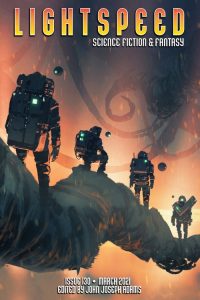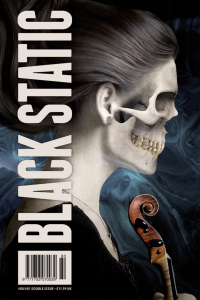Karen Burnham Reviews Short Fiction: Clarkesworld, BCS, and Lightspeed
 Clarkesworld 3/21
Clarkesworld 3/21
Beneath Ceaseless Skies 2/25/21, 3/11/21
Lightspeed 3/21
My two favorite stories in Clarkesworld in March are “Homecoming is Just Another Word for the Sublimation of the Self” by Isabel J. Kim and “The Orbiting Guan Erye” by Wang Zhenzhen (translated by Carmen Yiling Yan). Kim’s story features an amazingly appropriate use of second-person perspective as “you” are a first-generation Korean immigrant to the US in a world where immigrants crossing borders often split in two, leaving an instantiation of themselves to continue living in their home countries. Your character, Soyoung Kang, has an instantiation back in Korea, although in your brief conversations with your grandfather you never learn much about her. When he dies she reaches out, inviting you to the funeral. We learn about the history of this world and how even legends are different when travelers have two versions of themselves to contend with. We also learn how instantiations can recombine, leading to the central tension of the story. I wish the ending had pushed just a little farther past the climax, but this is a strong vision and well fleshed-out idea from a debut writer. Wang’s story imagines two men, Old Liu and Lil’ Zhang, keeping up with maintenance on an out-of-the-way space station. Their lives get a little excitement when they’re directed to examine a strange constellation of small satellites, still orbiting after no-one-knows-how-long. They capture and open the first one, which contains a flash-frozen carp in a sphere of ice. They’re able to revive it, and it becomes something of a mascot. The mystery of the satellites only deepens as they open more of them, but eventually we get a satisfying resolution – along with a lovely shout-out to Arthur C. Clarke’s story “Feathered Friend” (1957). I’d also like to commend Wole Talabi‘s “Comments on Your Provisional Patent Application for an Eternal Spirit Core” as a man’s brother leaves comments on an elaborately formatted Google Doc patent application, becoming increasingly alarmed at what the document proposes. Given the nature of our virtual world, it’s a particularly appropriate venue for a story, and Talabi does a great job of ratcheting up the tension as we read through what could have been a very dry slab of text.
Two stories feature the Fibonacci sequence, a perennial favorite of both SF writers and the universe at large. Arula Ratnakar‘s “Submergence” is a longer, complex story that involves experiencing someone else’s memories via optigenetics, the use of sea sponge material to fight disease, the discovery that sea sponges are much more neurally complex than anyone had suspected, youth climate change protests, using the Fibonacci sequence to encode a musical cryptographic language, ethically dodgy doctor/patient relationships, and much, much more. There’s also a murder mystery! There’s too much to summarize, but the fast-flowing, high-end science is worth the price of admission. “55 Plaque” by Isabel Lee imagines today but with the alternate history that aliens known as the Didacts have been sending mysterious plaques to Earth since 1879, with their timing following the Fibonacci sequence. Sam is a first grade teacher in the year that the 55 plaque should be arriving (55 years after the 34 plaque), and having to deal with kids who have denialist parents – and it appears that her own father has joined some sort of cult. She’s on a class field trip to a natural history museum when signs of the new plaque’s arrival start to appear, and the story becomes more frenzied from there as everyone, believers and deniers alike, start to gather. I thought the setup was excellent, but felt like we only got the first half of a larger story.
Beneath Ceaseless Skies #324 has a pair of stories featuring working class men getting largely screwed over by powerful forces. “Quintessence” by Andrew Dykstal imagines a high-altitude mine where the crew is completely isolated over the beyond-frigid winter. Sickness from the minerals around them is kept at bay only by doses of red medicine, and the witch who dispenses it and helps with other medical care; but they have a “new” old witch and people are starting to get sick, especially Loren’s brother-in-law. Loren believes a massive dose of medicine will cure him, so he breaks into the witch’s cabin and ends up murdering her when he’s discovered. Not long after, he discovers that she’s taken up residence in his head and, after her first bursts of vengeance, they start working together with a particularly humane foreman to solve the mystery of the encroaching illness. When they figure it out it sets up a particularly dramatic ending, although there’s a bit of a rush that skips over what must have been a number of difficult conversations to convince everyone needed to support a desperate, last-ditch “survival” attempt. “Cleaning Up After the Blackout Boys” by Evan Marcroft brings us Ustuus, living under a dystopian dictatorship and helping clean up and completely erase all traces of the victims of state assassinations. A widower, he barely gets paid enough to provide care for his young son, so he eats at a neighborhood food kitchen every morning – the proprietress of which demands a favor in return. This sends Ustuus on another erasure job, but with an ulterior motive, one which will require him to take a turn towards the monstrous. Keeping one’s humanity in the face of both literal and political monstrosity is no easy task.
Beneath Ceaseless Skies #325 has “Dead at the Feet of a God” by Izzy Wasserstein, a story told backward very effectively, starting with a true diviner about to attack the Iron God, and working in reverse through the steps that brought them there. An appropriate technique for a story that involves prophecy. Stephen Case imagines an interesting cosmology in “Parchment Sky” in which the sky is a physical boundary spinning at immense speed around the land. Those who live at the Eastern edge can (very carefully, with long poles and buckets of ink) write messages praising their god on the sky as it rises. The narrator’s brother is one of these writers when part of the ground crumbles. He loses part of his arm, but, more importantly, they start seeing writing coming up from below the horizon, words that had been getting scraped away before part of the ground disintegrated. This throws everything they thought they knew into doubt.
The science fiction side of Lightspeed leads with “Homecoming” by Claire Wrenwood. Marlo had always told herself that she’d give herself ten years of outer space adventuring before settling down to help her mother run the family bakery. Now she’s back, and they’re having a spa day together… featuring services from alien “soothers,” which Marlo knew as “squicks” when she was part of the team that discovered their planet. The flashbacks to Marlo’s time prospecting turn dark, and we learn a lot about her character in a short span… and so does the alien giving her a facial. Next we have a novelette from Adam-Troy Castro titled “And Now, A Preview of Coming Attractions“. This is our world, except that anyone who has a brush with death “flickers” out of existence and into what they believe will be the creature they will reincarnate as – for instance the narrator always gets flashes of life as an alien crustacean. His wife sees moments of life as a kind of alien golden ape, which apparently have extremely active and pleasurable sex lives. Our narrator has a creeping brain aneurysm, which means the flickering is becoming more frequent, and it’s only a matter of time before he flickers out for the last time, never to return. As he learns more about the crustacean way of life, is there any way he can change his fate-after-death? A well done work-through of an interesting premise. In the fantasy section, we get another in the Dusty Boots series of fairy tales from PH Lee, “The Bear Prince“. When the king demands a son after a string of daughters, the midwife trades the latest infant daughter for a bear cub. The court is forced to raise the bear as a prince… until the king remarries and his new wife bears a human son. At that point the bear prince is turned out of the castle and back to the forest, which leads to an inevitable clash of cultures. I think it’s fair to say that the vast majority of the readers will be rooting for the bears in this one.
Recommended Stories
“And Now, A Preview of Coming Attractions”, Adam-Troy Castro (Lightspeed 3/21)
“Quintessence”, Andrew Dykstal (Beneath Ceaseless Skies 2/25/21)
“Homecoming is Just Another Word for the Sublimation of the Self”, Isabel J. Kim (Clarkesworld 3/21)
“The Orbiting Guan Eyre”, Wang Zhenzhen (Clarkesworld 3/21)
Karen Burnham is an electromagnetics engineer by way of vocation, and a book reviewer/critic by way of avocation. She has worked on NASA projects including the Dream Chaser spacecraft and currently works in the automotive industry in Michigan. She has reviewed for venues such as Locus Magazine, NYRSF, Strange Horizons, SFSignal.com, and Cascadia Subduction Zone. She has produced podcasts for Locusmag.com and SFSignal.com, especially SF Crossing the Gulf with Karen Lord. Her book on Greg Egan came out from University of Illinois Press in 2014, and she has twice been nominated in the Best Non-Fiction category of the British SF Awards.
This review and more like it in the May 2021 issue of Locus.
 While you are here, please take a moment to support Locus with a one-time or recurring donation. We rely on reader donations to keep the magazine and site going, and would like to keep the site paywall free, but WE NEED YOUR FINANCIAL SUPPORT to continue quality coverage of the science fiction and fantasy field.
While you are here, please take a moment to support Locus with a one-time or recurring donation. We rely on reader donations to keep the magazine and site going, and would like to keep the site paywall free, but WE NEED YOUR FINANCIAL SUPPORT to continue quality coverage of the science fiction and fantasy field.
©Locus Magazine. Copyrighted material may not be republished without permission of LSFF.







